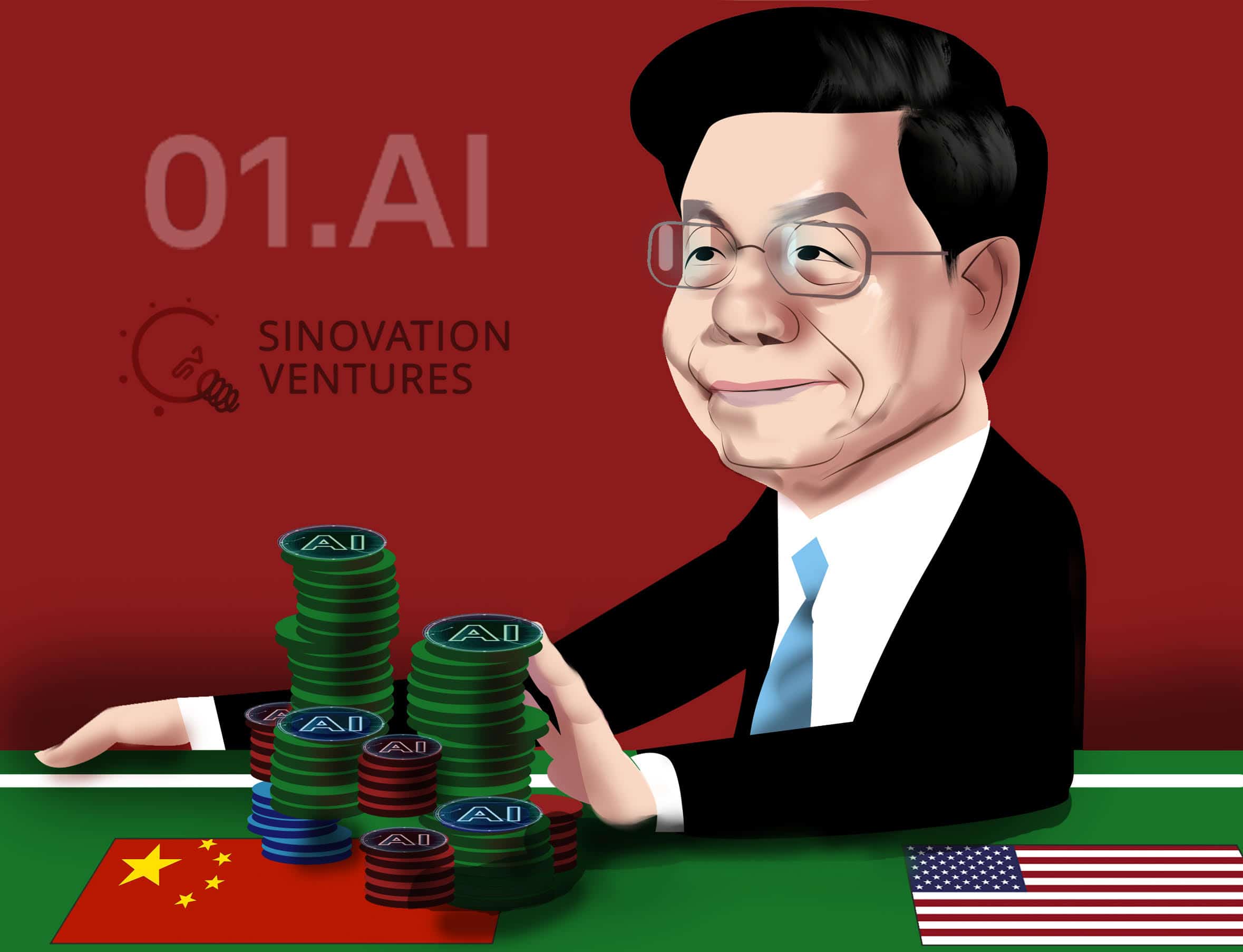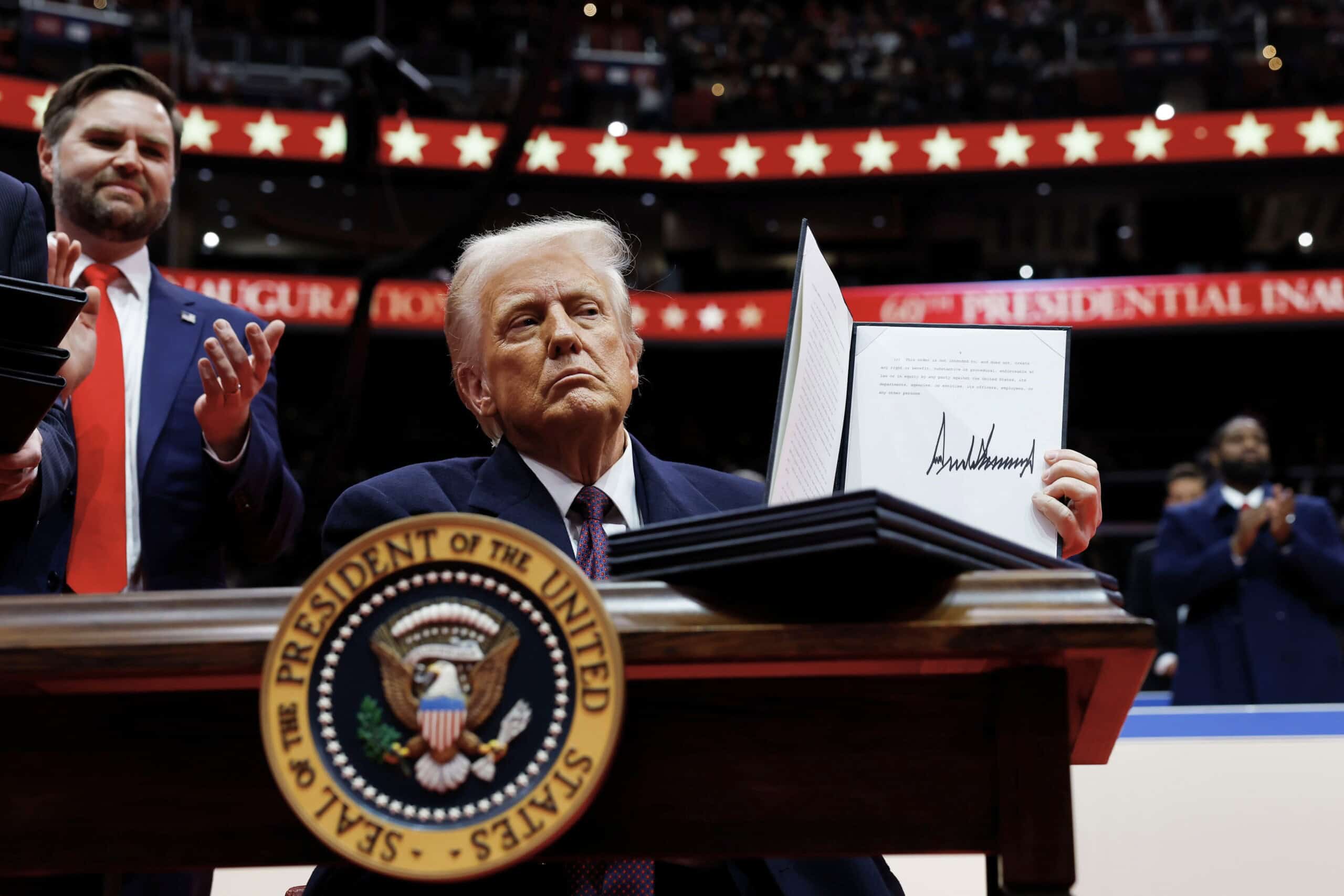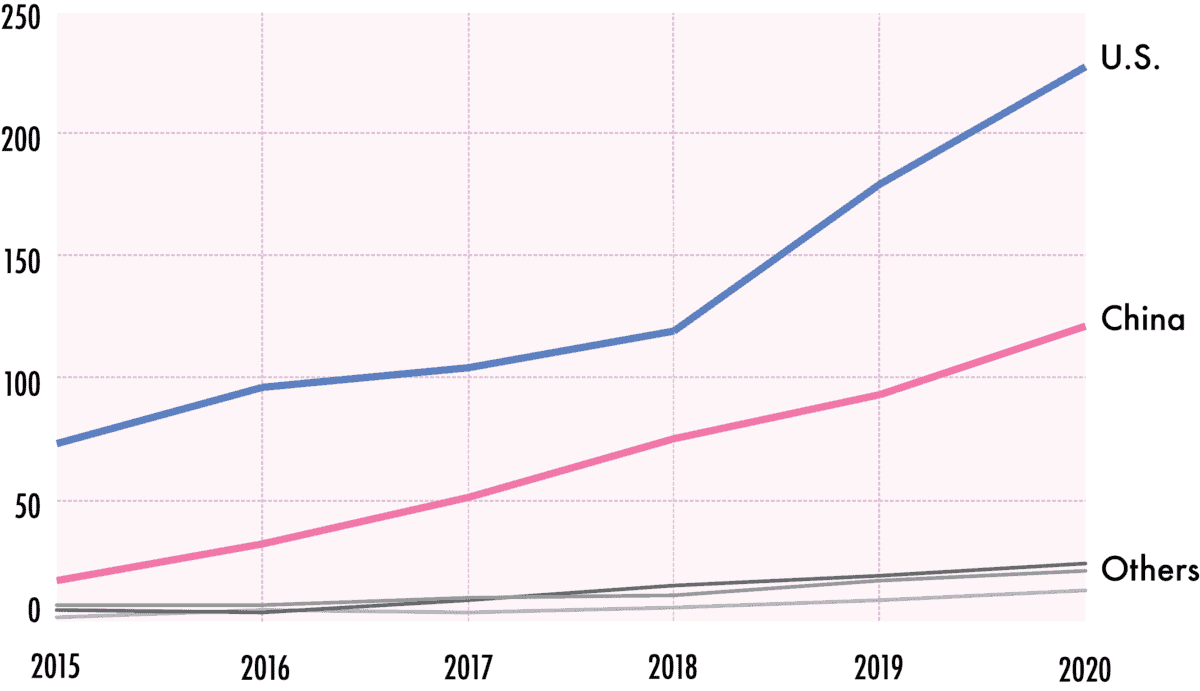
Data: CB Insights, numbers are mid-year values, with most recent data as of June 11, 2020.
Unicorns — privately held startups valued at more than $1 billion — have become a symbol of innovation and the entrepreneurial spirit since the term was coined in 2013. In this week’s installment of The Big Picture, we show the narrowing race between U.S. and Chinese unicorns, and introduce readers to the Chinese unicorns leading the herd, as well as the VC firms backing their rise.
Top Unicorn-Producing Nations
Though the Hurun Report made news last year by announcing that China surpassed the United States to become the country with the most unicorns, other sources tell a different story. According to PitchBook’s data1Criteria for unicorn status includes most recent post-money valuation greater than $1 billion, VC backing, and private ownership. from June 11, 2020, there are 444 unicorns in the world, and the United States is still far out ahead with 237 unicorns, more than double China’s 113.
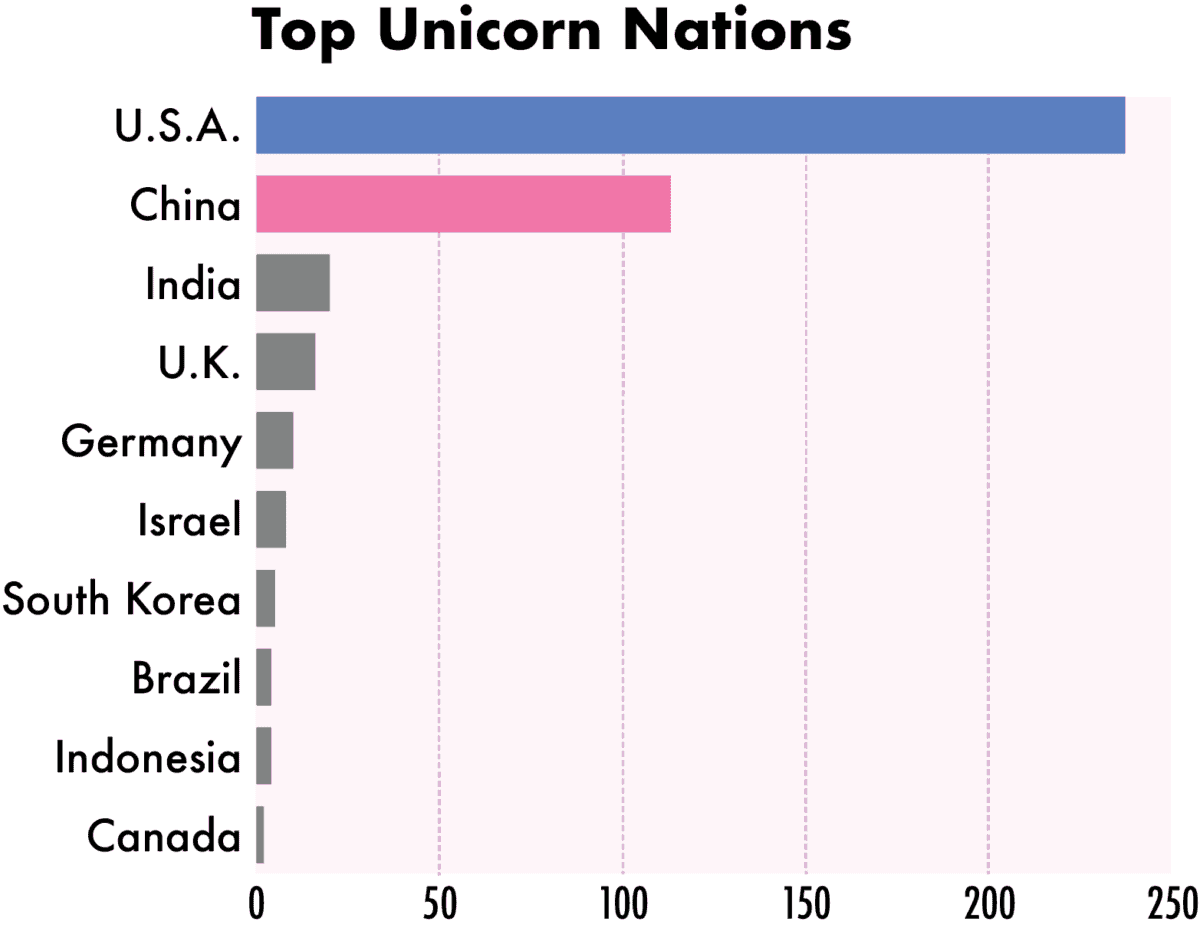
Data: PitchBook, as of June 11, 2020.
The U.S. and China are the only countries that have a significant number of unicorns. India, in third place, has 20, lagging far behind China, according to data from PitchBook.
There’s been a huge population boom for unicorns in the last five years. According to CB Insights2There are minor discrepancies between data provided by PitchBook and CB Insights. CB Insights did not respond to requests for clarification about its methodology in determining unicorns, though their website notes that unicorns include “current private companies” valued at $1 billion or more., there were only 119 unicorns globally in mid-year 2015, a number that has nearly quadrupled since.
The World’s Biggest Unicorns
Though the United States is home to the most unicorns, China is home to the world’s top three most valuable: Ant Financial, ByteDance, and Didi Chuxing. Ant Financial, a financial tech company, was recently valued at $200 billion in private share offerings, according to a Reuters report, up from $150 billion in its 2018 fundraising round. Its payments platform, Alipay, had over 900 million active users in China as of last September, according to company filings. ByteDance, last valued at $95 billion, owns TikTok and its Chinese counterpart, Douyin. ByteDance’s Toutiao and Douyin services are massively popular in China, and ByteDance announced that it had reached 400 million Douyin users in early 2020. Didi Chuxing is a ride-hailing app valued at $58 billion dollars — a valuation from 2018 that was once dismissed as “frothy” — and seems to have been hit hard by coronavirus lockdowns in China.

Data: PitchBook, as of June 11, 2020.
Many of the biggest American unicorns are household names in the United States, like Airbnb, Elon Musk’s SpaceX, and the delivery service DoorDash. Some unicorns from recent years, like Pinterest and Github, have lost unicorn status by going public or being acquired, while others, like the scooter company Lime, have lost value, dipping below that $1 billion mark. In China, the electronics company Xiaomi went public in 2018 after being near or at the top of CB Insights’ unicorn list for three years, as did Didi Chuxing competitor, the ride-hailing company UCAR., which has faced controversy in recent weeks due to its ties to Luckin Coffee.
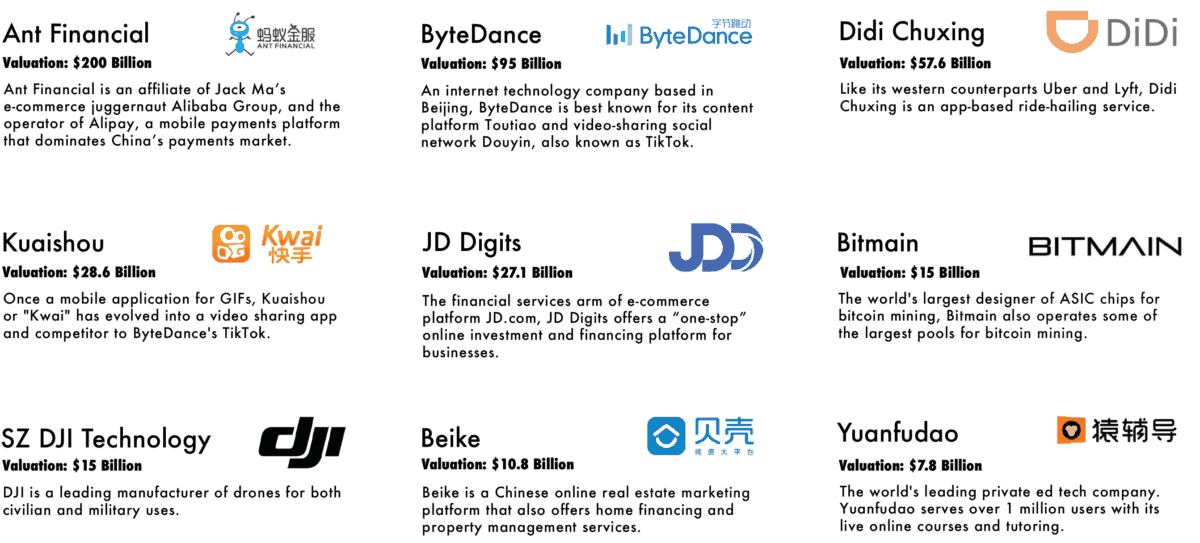
Valuations from Pitchbook as of June 11, 2020.
Recent policy changes have eased the path to domestic listing for some Chinese unicorns. The China Securities Regulatory Commission shortened the time to IPO approval for companies in biochemistry, cloud computing, artificial intelligence and advanced manufacturing. The Shanghai Stock Exchange established its STAR Market for innovative science and technology companies in 2019. The Hong Kong Stock Exchange, meanwhile, created a rule that loosened revenue and profit listing requirements for biotech companies.
Some of China’s biggest unicorns are subject to export controls in the United States. Several, including AI companies SenseTime and Megvii, are on the U.S. Entity List for providing technology used to implement mass surveillance of Uighurs in Xinjiang.
By different metrics, the United States and China could each be seen as pulling ahead in the fight to get the biggest unicorn herd. While there has been significant growth in both countries, China now has more than seven times the number of unicorns it had in 2015 while the United States’ rate of growth has been slower, only tripling during that same time period. The total number of United States unicorns, however, has gone up by 154 to China’s 107, according to CB Insights data. The total valuation of all U.S. unicorns, too, has risen to an estimated $646 billion from $274 billion in 2015, while the valuation of Chinese unicorns has jumped to nearly $439 billion from just $107 billion.
Top Investors in Chinese Unicorns
Some of the top unicorn investors are big names in venture capital, while others are the venture arms of diversified conglomerates like Tencent and Alibaba — companies that were themselves unicorns before they went public.
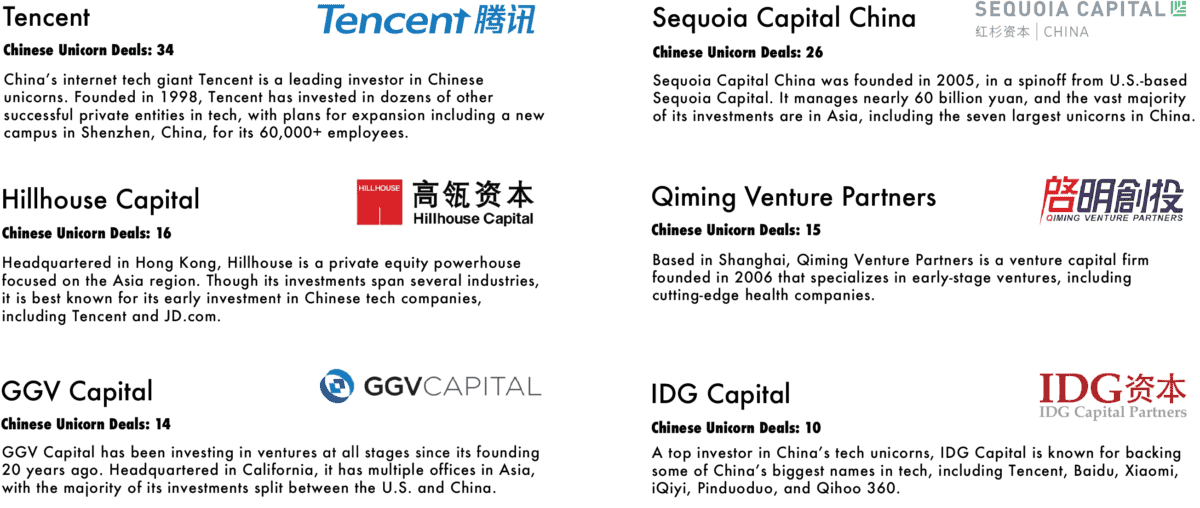
Data: Pitchbook, as of June 11, 2020.
Tencent, Sequoia Capital China, Hillhouse Capital, Qiming Venture Partners, GGV Capital, and IDG Capital are among the most frequent investors in Chinese unicorns — almost all of which are headquartered in China — but other popular investors include Tiger Global Management, based in New York, and SoftBank Group’s investment arm, based in Tokyo.
Investors have also recently jumped at entities that potentially hold new value in the wake of the Covid-19 pandemic. The edtech start-up Yuanfudao, for example, offers live remote courses and raised $1 billion at the end of March 2020 with large investments from Tencent, Hillhouse, and IDG.

Emma Bingham is a Boston-based editor for The Wire. Previously, she was editor in chief of The Tech at the Massachusetts Institute of Technology. @emmapbingham

Kara Greenberg is an editor at The Wire. @karagreenberg_

Hannah Reale is an intern with The Wire. Previously, she reported for the New England Center for Investigative Reporting, The West Side Rag, and her college newspaper, The Wesleyan Argus. @hannahereale

